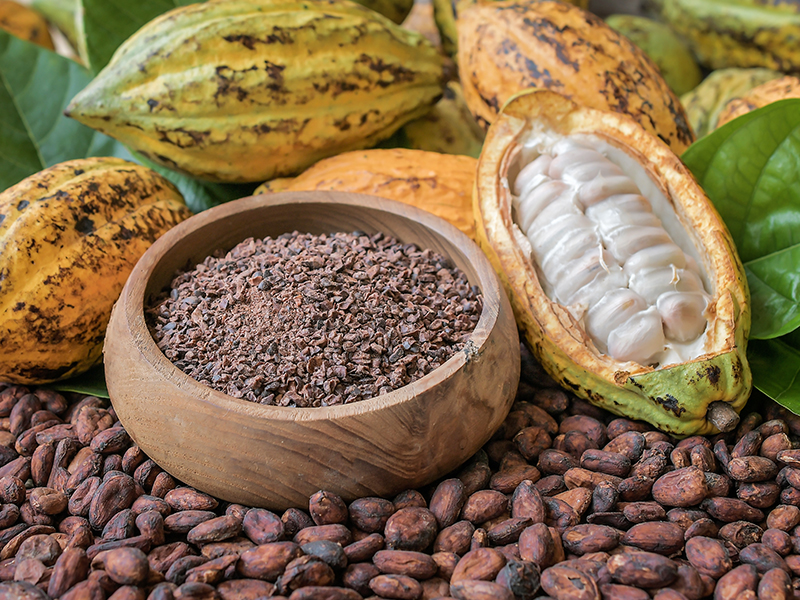Colombian cocoa is recognized worldwide for its flavor and aroma characteristics,
being part of the select group of specialty cocoas. In addition, the sector is a driver of
employment generation and sustainable, environmental, and economic development
in the country.
PRODUCTION OF COCOA BEANS IN COLOMBIA
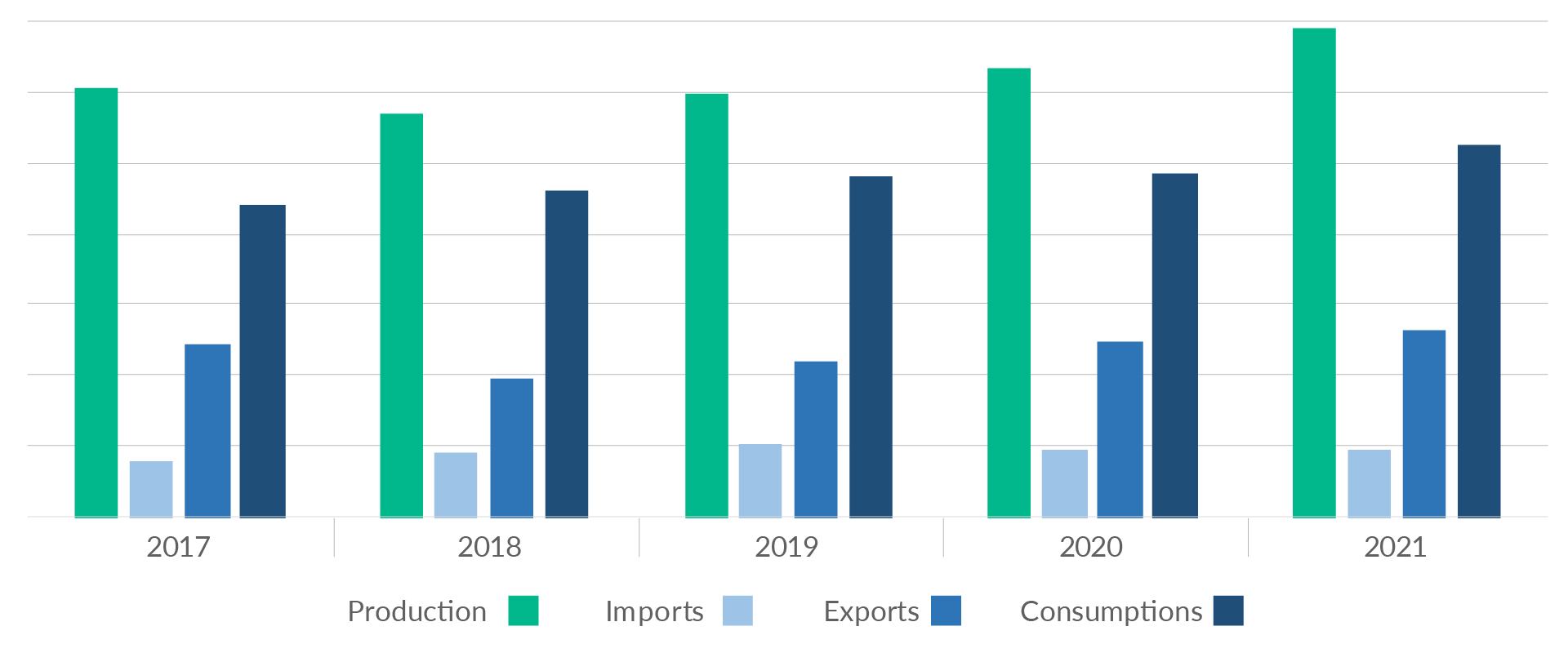
DANE, Fedecacao
The semi-finished and finished products were converted into cocoa beans for calculation purposes.
Conversions: 1801:1; 1802-1803-1804-1805: 125%; 1806: 33%.

COLOMBIA HAS IDEAL CONDITIONS FOR PRODUCING A WIDE VARIETY OF SPECIALTY COCOA
Colombia already produces a large amount of cocoa classified as "Fine or Flavor". According to ICCO, 95% of Colombian cocoa meets this condition. In addition, regional climatic and genetic diversity generates a broad palette of flavors, creating unique sensory profiles for Colombian cocoa, depending on its origin.
In addition, Colombian cocoa contributes to the country's sustainable development: environmentally, economically, and socially. On the one hand, 90% of cocoa crops have forestry arrangements that capture 4.3 tons per hectare per year (Fedecacao). On the other hand, the country's cocoa production structure has a high social impact, affecting more than 65,000 families.
___________
Source: Fontagro
THE COUNTRY HAS POTENTIAL AS AN IMPORTANT PLAYER IN THE INTERNATIONAL SPECIALTY COCOA MARKET
Colombia is one of the leading suppliers of fine or flavor cocoa, ranking 5th in world exports, which opens doors in the world's most sophisticated markets.
Production in Colombia is aligned with large buyers "ESG" commitments. It has clear policies on zero deforestation, strong regulations against child labor and a high domestic price that favors the producer.
The quality of Colombian cocoa has been recognized on numerous occasions at the Paris Chocolate Salon, highlighting the quality of the country's different origins.
Colombia has trade agreements in the most important markets for the sector, with most Colombian products entering the United States and the European Union duty-free.
International companies are investing in Colombia to export specialty cocoa, as is the case of 12-Tree Finance, a German investment fund that has invested in crops since 2017.
_______________
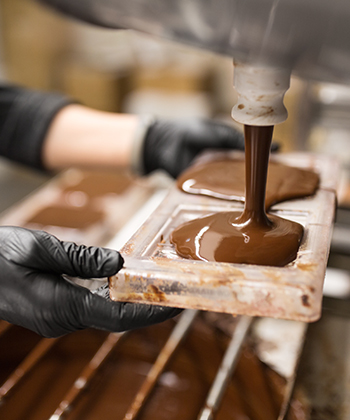
COCOA IS A SECTOR OF NATIONAL RELEVANCE, PRIORITIZED BY THE GOVERNMENT
Cocoa cultivation is prioritized in the agricultural management plan, which boosts the growth of its value chain by working on pillars such as inputs and production, marketing, financing, research, and institutional coordination.
To achieve these strategies, the National Government has multiple tools that facilitate access to lines of credit, financing for research projects, technology transfer, and solutions to bottlenecks to increase production, sales, and exports of Colombian cocoa.
In addition, the industry has consolidated companies (Compañía Nacional de Chocolates and Casa Luker, who purchase supply the local market and export beans, derivatives, and finished products) and important new players that ensure the competitiveness of the sector.
Also, cocoa supports the consolidation of peace in the country. Nearly 60% of national production occurs in ZOMAC (Zones most affected by the conflict) municipalities. In addition, 25,000 hectares of illicit crops have been replaced by cocoa.
______________________
Source: Minagricultura, UNODC
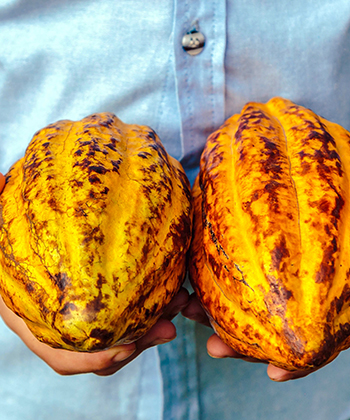
AS A DESTINATION FOR INVESTMENT, COLOMBIA STANDS OUT IN THE REGION
The country has a friendly environment for foreign direct investment. According to Doing Business, Colombia ranks first in Latin America regarding credit facilities and protection for minority investors.
The exchange rate facilitates investment since, in the last year, it has remained above 3,500 pesos per dollar, favoring the purchasing power of investors.
The national government offers an attractive incentive policy for cocoa investments. These include income tax exemption for ten years for rural development projects; income tax incentives for investments made in ZOMAC; and Free Trade Zones - with the possibility of agro-industrial and/or sole proprietorship. In addition to benefits in the payment of taxes: tariffs, income, and VAT.
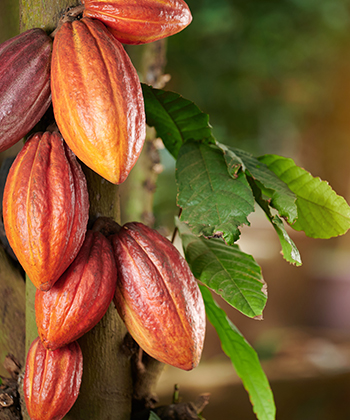
SEVERAL BUSINESS OPPORTUNITIES ARE AVAILABLE IN COCOA, BY PRODUCTS, AND SERVICES
The country has a wide availability of land for investment in planting new crops, reaching 7.3 million hectares with high suitability for the development of cocoa crops (UPRA - AgriculturalRural Planning Unit).
Renovation of aged cocoa trees to extract higher value per hectare is another opportunity in the country. It is estimated that about 45% of cocoa trees in the country are aged. Renovating them would significantly increase national production.
The construction of community post-harvest centers to obtain excellent and homogeneous quality will help overcome the challenges identified at this value chain stage.
There's an opportunity with chocolate and cocoa byproducts processing plants to add greater value to grain exports. It is estimated that 41% of the country's exports correspond to value-added finished products.
Supply of related services to support the internationalization of the sector. There is an opportunity to install laboratories that can measure heavy metals or traces of products following international standards and requirements. The sector also needs to adopt global trends such as precision agriculture, Fintech, and blockchain.
______________
Source: UPRA
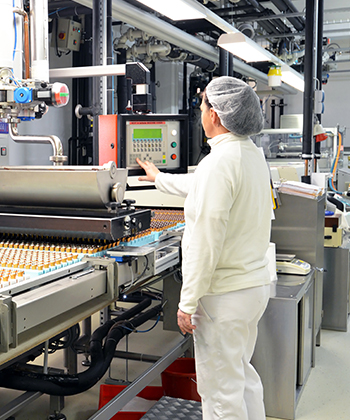
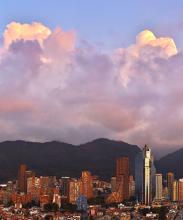
PROCOLOMBIA is the entity in charge of promoting Exports, International Tourism, Foreign Direct Investment and the Country Brand, in order to position Colombia in the world. Get to know the national and international network of offices, where you will find comprehensive support and advice.

